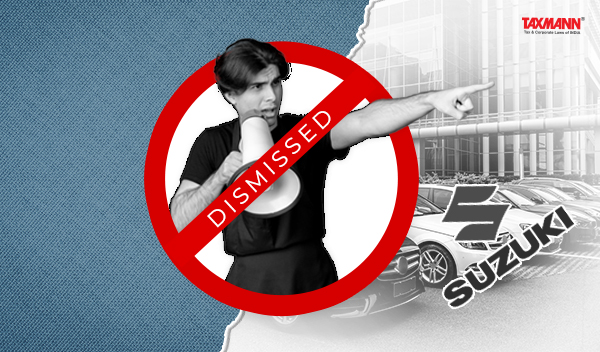Complaint for Unfair Pricing Against Maruti Suzuki to Be Dismissed as Its Market Share in SUV Segment is Merely 22% | CCI
- Blog|News|Competition Law|
- 2 Min Read
- By Taxmann
- |
- Last Updated on 15 May, 2024

Case Details: Harmit Ahuja v. Maruti Suzuki India Ltd. - [2024] 162 taxmann.com 406 (CCI)
Judiciary and Counsel Details
-
- Ms Ravneet Kaur, Chairperson, Anil Agrawal, Ms Sweta Kakkad & Deepak Anurag, Member
Facts of the Case
In the instant case, OP was a leading automobile manufacturer brand. The Informant/customer of OP booked a variant of an SUV car launched by OP and paid the booking amount before the car was delivered.
When booking of a said variant of the car decreased, OP reduced the price of the car and loaded the product with freebie accessories. The informant sent an email to OP seeking a refund that OP charged in excess for the car bought by him and OP refused a refund.
Consequently, the informant filed instant information, alleging OP for contravention of section 4 of the Competition Act, 2002 on grounds that, OP abused its dominant position in market and imposed unfair pricing strategy with respect to car variant bought by informant.
Further, the informant stated that the new pricing strategy introduced variant was laced with several freebie accessories and extended warranty free of cost, which led to a downfall in resale prices of cars purchased by them.
It was noted that OP’s market share in the entire SUV segment of the passenger cars market was only 22%. Thus, OP did not hold a market share large enough to enable it to operate independently of competitive forces prevailing in the market or to affect its competitors, consumers, or the market in its favour, and OP did not appear to be a dominant player in the market.
CCI Held
The Competition Commission of India (CCI) observed that the grievance raised by the informant was an inter-se dispute between the informant and OP regarding the price of the product sold by OP to the informant; no competition issue or concern arose from the facts and allegations stated by the informant.
The CCI held that no prima facie case of contravention of provisions of section 4 was made out against OP and matter was to be closed in terms of provisions contained in section 26(2) of the Competition Act, 2002.
Disclaimer: The content/information published on the website is only for general information of the user and shall not be construed as legal advice. While the Taxmann has exercised reasonable efforts to ensure the veracity of information/content published, Taxmann shall be under no liability in any manner whatsoever for incorrect information, if any.

Taxmann Publications has a dedicated in-house Research & Editorial Team. This team consists of a team of Chartered Accountants, Company Secretaries, and Lawyers. This team works under the guidance and supervision of editor-in-chief Mr Rakesh Bhargava.
The Research and Editorial Team is responsible for developing reliable and accurate content for the readers. The team follows the six-sigma approach to achieve the benchmark of zero error in its publications and research platforms. The team ensures that the following publication guidelines are thoroughly followed while developing the content:
- The statutory material is obtained only from the authorized and reliable sources
- All the latest developments in the judicial and legislative fields are covered
- Prepare the analytical write-ups on current, controversial, and important issues to help the readers to understand the concept and its implications
- Every content published by Taxmann is complete, accurate and lucid
- All evidence-based statements are supported with proper reference to Section, Circular No., Notification No. or citations
- The golden rules of grammar, style and consistency are thoroughly followed
- Font and size that’s easy to read and remain consistent across all imprint and digital publications are applied



 CA | CS | CMA
CA | CS | CMA
